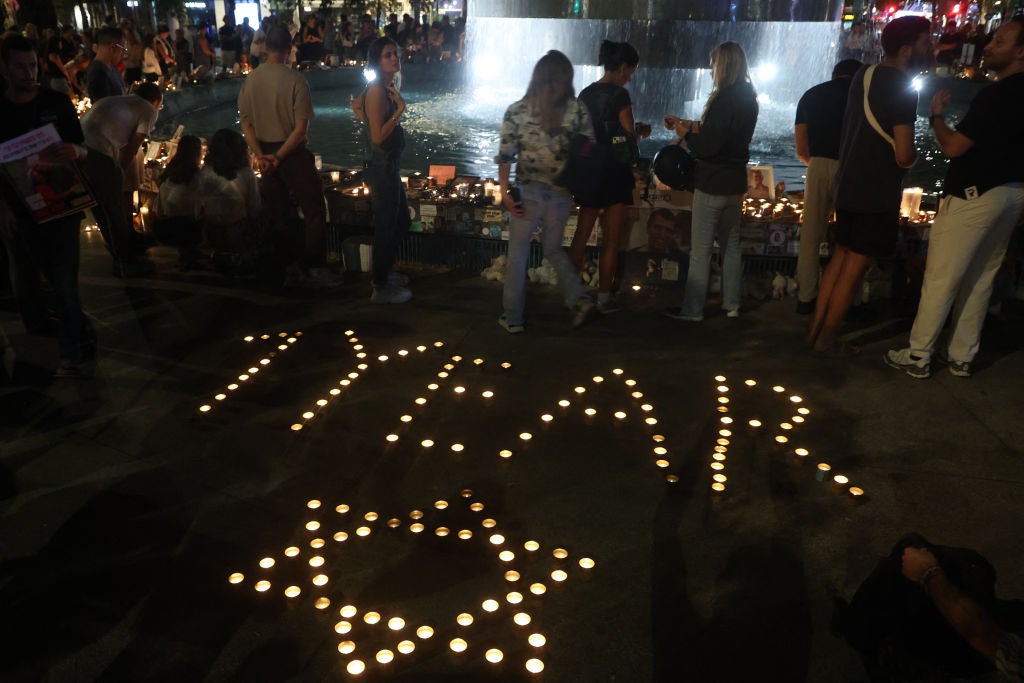One year on from October 7, Washington can’t offer a clear path forward
With no end in sight to the fighting, hostage families and civilians in the region lament failures of leadership in Jerusalem and Washington

Your support helps us to tell the story
From reproductive rights to climate change to Big Tech, The Independent is on the ground when the story is developing. Whether it's investigating the financials of Elon Musk's pro-Trump PAC or producing our latest documentary, 'The A Word', which shines a light on the American women fighting for reproductive rights, we know how important it is to parse out the facts from the messaging.
At such a critical moment in US history, we need reporters on the ground. Your donation allows us to keep sending journalists to speak to both sides of the story.
The Independent is trusted by Americans across the entire political spectrum. And unlike many other quality news outlets, we choose not to lock Americans out of our reporting and analysis with paywalls. We believe quality journalism should be available to everyone, paid for by those who can afford it.
Your support makes all the difference.Three hundred and sixty-five days after Hamas militants stormed Israeli military bases and communities in an attack the group dubbed the “Al-Aqsa Flood”, the region remains embroiled in a bloody conflict. Now, US leaders see few positive outlooks for either Israel or the Palestinian territories.
Monday marked the one-year anniversary of what many have dubbed the worst attack on Jews since the Holocaust. It also marked the beginning of a three-way war between Hamas, Israel and Hezbollah, with civilians all across the region caught in the crossfire.
One year later, the death toll stands at nearly 1,200 in Israel and more than 40,000 in Gaza, with some estimates ranging far higher. A staggering amount of human suffering and misery has played out across Palestinian territories, while families in both Israel and the US remain in the uncertain hell of not knowing the fate of family members taken captive by Hamas fighters into the wartorn Gaza Strip.
In Washington, the mood on the issue is grim. On the right, Republicans largely continue to wholeheartedly back the Trump-loving prime minister of Israel, Benjamin Netanyahu, while rebuking their Democratic rivals for any efforts to lecture Israeli forces on the issue of civilian casualties. Democrats continue to largely back President Joe Biden’s efforts to reach a ceasefire, with some exceptions on the party’s right flank. But even Biden’s own officials have begun acknowledging that such a deal — including an agreement on the return of the remaining US hostages — is almost certainly out of reach until a new US president is sworn in.
And that’s maybe the biggest weight around his vice president’s neck as Kamala Harris finishes the final sprint towards the ballot box in November: the Biden-Harris administration has laid out its goal for Israel and the Palestinian territories. But it has proven so far to be incapable of reaching it.
At the State Department, press flacks continued to argue on Monday that Israel’s military operations in Lebanon — which began in earnest in the past few weeks — remain limited, and do not constitute a major escalation of the conflict. Spokesman Matthew Miller declined to rebuke Israeli forces over the destruction of a road leading to the country’s main airport on Monday. He repeated Israeli strikes were, in the White House’s view, limited — while also conceding that such operations have previously preceded a prolonged occupation.
Miller on Monday also once again presented the Biden-Harris administration’s vision for the region: a safe, secure Israel neighboring a safe, secure, sovereign and unified Palestinian state — combining both the West Bank and Gaza — under the rule of an authority other than Hamas.
He then proceeded to make clear that the US is no closer to realizing that vision than it was weeks or even months ago. That was evident as he stated the US’s support for a response to an Iranian ballistic missile attack that was halted by US and Israeli counter-fire and ultimately caused no deaths. It was even more evident as he contended that it was “difficult” to say whether Israel’s long-term security had been improved at all by the war, which he added had “degraded” Hamas and Hezbollah’s immediate military capabilities.
One year on, the final chapter of Joe Biden’s presidency has become consumed by the shockingly deadly war in Gaza and a massive erosion of stability across the entire Middle East. Now, the question is how much that vision changes come January, when a new occupant enters the Oval Office — and whether that new US administration is any more effective at delivering a resolution.
Join our commenting forum
Join thought-provoking conversations, follow other Independent readers and see their replies
Comments